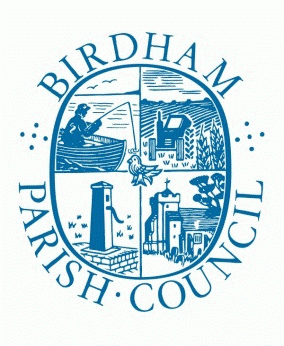Outline Document relating to Community Resilience (Emergency Planning) - Updated
Community Resilience (Emergency Planning)
The resilience of a community is its ability to deal with problems that arise. In the context of Emergency Planning this means having plans in place to reduce the impact of events such as severe weather or a major traffic accident. West Sussex County Council, along with many other councils across the country, is keen to encourage communities to develop emergency plans that complement the plans of the emergency services an d other professional agencies.
A community resilience team is developing a plan for Birdham, which, as you will see over the coming months, will be supported by the work of other groups in the community. We will publish our progress on the Parish Council web-site and newsletter and the team welcomes any feedback.
Team members are: J Finch, A Grafham, M Barker, R Marshall, G Barton and D MacDonald with support from S Gindra (WSCC)
In our first meeting we identified a number of groups who will need to be consulted as we develop our plan, either because we need to make sure our plan fits with theirs or because they might have resources and skills we will need in an emergency (or both).
Groups (so far): Chichester Marina, Chichester Yacht Club, Birdham Primary school, Nursing Home, farmers, B&B’s, caravan parks, WI, Church, Cricket Club, Village Hall Trust, Chairmen of Resident’s Associations.
We also recognised the need for a robust communication network, with representatives across the community (for example someone in each road) who will have the local knowledge needed to help the emergency services respond appropriately. This is where residents can start to get involved. We have now written to Residents
Association Chairmen asking for names of communication volunteers who would be able to help in the following ways:
- To act as a contact for the Emergency Services in identifying potentially vulnerable people in an emergency
- To notify the Emergency Plan team of problems in their area
- To assist the Emergency Plan team in notifying residents of an emergency
- To deliver leaflets in their area as provided by the Emergency Plan team, explaining simple actions householders can take to help themselves prevent problems and prepare for emergencies
Further details would be provided to any volunteers. It is important to stress we are not asking for someone who will necessarily be able to deal with an emergency if it arises but who will act as a communication link.
In addition we will ask for volunteers and ideas at the Neighbourhood Plan Open Day on 16th March
The following hazards were identified as having a potential impact in Birdham:
Severe weather (Wind; snow/ice; flooding (coastal); flooding (rain); heat-wave); Pandemic Flu or other national disruption; Failure of local services (refuse strike; interruption of water supply; failure of foul drainage; loss of electricity/gas); Air/traffic accident; animal disease.
Having identified the hazards we are identifying the likely consequences and considering our actions in the following areas:
Avoidance, early warning, reaction, clear up (short term), restoration (longer term)
Avoidance includes the work being done on the drainage system right now and the advice leaflets we will be developing or sourcing and sending out to Residents via our communication network.
Our next meeting will be with Shane Gindra of West Sussex County Council Emergency Planning Team, to discuss the contribution he can make, possibly through use of existing strategies and processes that we could incorporate into our plan, such as early warning networks. In the meantime the team is working on the draft plan through the use of a Dropbox, which is an electronic location we can access to add updates to the plan, without having to email each other.
Your household can make a contribution to community resilience right now by making a Family emergency plan. There are several useful links on the district council web-site (www.chichester.gov.uk) including ‘Be prepared for bad weather’ and on the Environment Agency web-site (www.environment-agency.gov.uk/homeandleisure/floods/31624.aspx)

